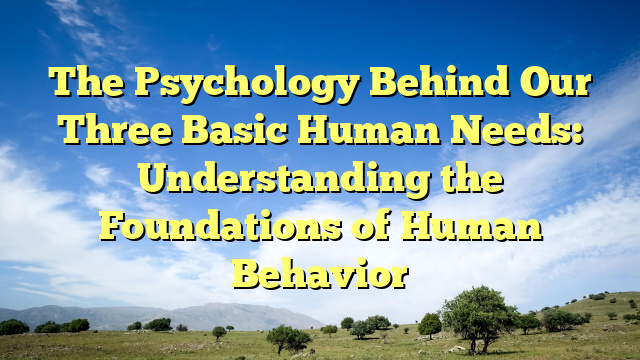The Psychology Behind Our Three Basic Human Needs: Understanding the Foundations of Human Behavior
The Psychology Behind Our Three Basic Human Needs: Understanding the Foundations of Human Behavior
Introduction
Human behavior is a complex subject that has fascinated psychologists and researchers for centuries. Why do we act the way we do? What drives our actions and decisions? One way to understand human behavior is by examining our basic human needs. These needs are fundamental to our well-being and play a crucial role in shaping our thoughts, emotions, and actions.
The Three Basic Human Needs
According to psychologists, there are three basic human needs that drive our behavior: the need for autonomy, competence, and relatedness.
1. Autonomy
The need for autonomy refers to our desire for independence and freedom. It is the need to feel in control of our own lives and to make choices that align with our values and beliefs. When this need is not met, we may feel frustrated, trapped, or powerless. On the other hand, when we have a sense of autonomy, we feel empowered and motivated to pursue our goals.
2. Competence
The need for competence is the desire to feel capable and effective in our actions. It is the need to master new skills, overcome challenges, and achieve a sense of accomplishment. When this need is fulfilled, we experience a boost in self-confidence and motivation. However, when we feel incompetent or inadequate, we may become demotivated and doubt our abilities.
3. Relatedness
The need for relatedness refers to our need for social connections and a sense of belonging. It is the desire to feel connected to others, to be understood, and to experience intimacy and support. When this need is satisfied, we feel loved, accepted, and valued. However, when we lack social connections or experience rejection, we may feel lonely, isolated, and emotionally distressed.
The Role of Basic Human Needs in Behavior
Our basic human needs play a significant role in shaping our behavior. They influence our thoughts, emotions, and actions in various ways:
1. Motivation
Our basic human needs serve as powerful motivators. When our needs are met, we feel satisfied and content. However, when our needs are unfulfilled, we experience a sense of discomfort or tension, which motivates us to take action to meet those needs. For example, if our need for autonomy is not met in a particular situation, we may feel compelled to assert our independence or seek out opportunities that allow us to have more control over our lives.
2. Decision-making
Our basic human needs also influence our decision-making process. We are more likely to make choices that align with our needs and values. For example, if our need for relatedness is high, we may prioritize spending time with loved ones over other activities. Understanding our basic needs can help us make more informed decisions and prioritize what is truly important to us.
3. Emotional well-being
When our basic needs are met, we experience positive emotions such as happiness, satisfaction, and fulfillment. On the other hand, when our needs are unmet, we may experience negative emotions such as frustration, anger, or sadness. Recognizing and addressing our basic needs is essential for maintaining emotional well-being.
Applying the Knowledge of Basic Human Needs
Understanding our basic human needs can have practical implications in various areas of life:
1. Personal Growth
By recognizing our basic needs, we can identify areas for personal growth and development. For example, if we realize that our need for competence is not being fulfilled in our current job, we may seek out opportunities for learning and skill development to enhance our sense of competence.
2. Relationships
Understanding the importance of relatedness can help us build and maintain healthy relationships. We can prioritize spending quality time with loved ones, actively listen and empathize with others, and create a supportive and nurturing environment.
3. Work Environment
Employers can also benefit from understanding the basic human needs of their employees. By creating a work environment that fosters autonomy, competence, and relatedness, employers can enhance employee satisfaction, motivation, and productivity.
Conclusion
Our basic human needs are fundamental to our well-being and play a crucial role in shaping our behavior. The need for autonomy, competence, and relatedness drive our thoughts, emotions, and actions. By understanding and addressing these needs, we can enhance our motivation, decision-making, and emotional well-being. Furthermore, applying this knowledge in personal growth, relationships, and work environments can lead to a more fulfilling and satisfying life.

